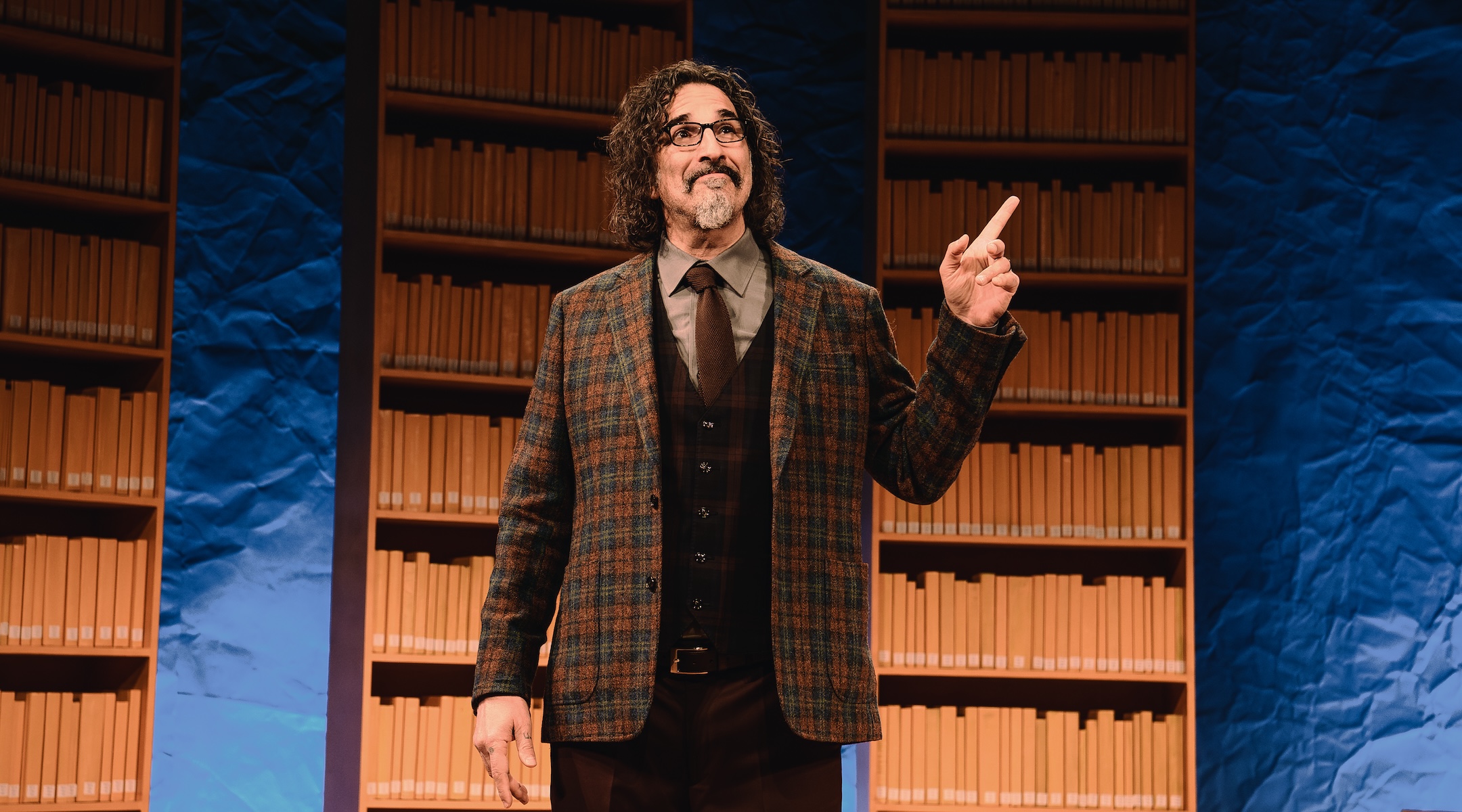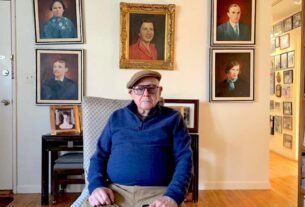Jewish stand-up comedian Gary Gulman is trying a new approach in his new, one-man off-Broadway show, “Grandiloquent.”
Between the usual moments of hilarity, Gulman, 54 — a “Last Comic Standing” finalist whose most recent comedy special, “Born on Third Base,” was released on Max in 2023 — takes a more serious, vulnerable approach to storytelling about his Jewish childhood in Massachusetts, his parents and his struggles with depression.
The concept is, in some ways, “diametrically opposed to stand-up,” Gulman said, “where anyone giving you notes would say, ‘Hey, take out that part where you make the audience sad for a while.’”
While “Grandiloquent,” directed by Moritz von Stuelpnagel, undoubtedly makes people laugh, it also perhaps unexpectedly pulls at the audience’s heartstrings, thanks to Gulman’s honest, empathetic examination of his youth, his family and his journey to self-acceptance.
One week into his residency at the Lucille Lortel Theatre (121 Christopher St.), the New York Jewish Week spoke with Gulman about the challenge of not being funny, his favorite Yiddishisms and his place in the storied Jewish comedic tradition.
This interview has been lightly condensed and edited for clarity.
1. Tell us about “Grandiloquent” and what audiences can expect.
Oh man, I’ve been told people have laughed and cried. So they can expect an emotional — I wouldn’t call it a roller coaster — but an emotional flume ride, maybe. I can’t call it tragicomic, nor comitragic, but there are some sad, sad moments in it — but it’s mostly hilarious. That’s what I would say.
2. The show is full of funny moments, but in the end, audiences are left with a heavier feeling. How did you decide to write a show that doesn’t end with a punchline?
Oh, I think that it’s not a funny punchline, but it’s a punchline. A stand-up act is just, “How many funny things can I say in an hour and a half?” And then you write a one-person show, there is a lot of expressing, well, “What does this show want to be?” This show, I wanted it to end with the beginning. I open up talking about the first book I ever read, and then I close by talking about that same book. I like that, when movies or books or plays end where they began. And so that was important to my director [von Stuelpnagel] and me, who I collaborated with a lot on the writing. And so it ended with a punchline that wasn’t all that funny, but hopefully will resonate — which is all you really want from a punchline.
3. How was prepping for “Grandiloquent” different from prepping for a stand-up special?
The entire intention of the show was to do something out of my comfort zone, something that would be very challenging. And not being funny is very challenging for a stand-up comedian, especially one as obsessed and passionate about finding the funniest things I can say, to the point of it being unhealthy sometimes. So the challenge, ironically, is to not be funny, when usually the challenge is to make this as funny as possible.
4. What are the biggest ways your Jewishness shows up in your work?
I was reading the translator’s foreword to “Tevye the Dairyman,” which is a Sholem Aleichem collection that they made into “Fiddler on the Roof.” But it’s not “Fiddler on the Roof.” Anyhow, they were commenting on these Russian Jews being unable to not talk. There’s a collection called “The Railroad Stories” in which a Jewish person is so involved in talking that they miss their stop — or, people are surprised that the person got off at the train stop even though they were still talking. I didn’t realize that about our history, but it makes sense now that a lot of Jewish people have done interesting work in stand-up comedy.
5. Do you think you fit into the Jewish comedic tradition?
Oh my God, are you fucking kidding me? How dare you! (Laughing.) I’m saying my name in the same sentence as Sholem Aleichem, imagine how obnoxious I am! Um, yeah, I think so, because I feel like I am influenced by watching so much comedy growing up which, even if they weren’t Jewish, they had Jewish sensibilities.
6. Who are some of your biggest Jewish comedy influences?
I used to like listening to Jackie Mason when I was growing up, and David Brenner was my all-time favorite, and Richard Lewis, and one of the guys has been disgraced so I don’t even say his name, but that’s who I was listening to growing up. And Garry Shandling is another one who I fell in love with. My mom took me to see “The Tonight Show with Johnny Carson” when I was 13 for my bar mitzvah, and Garry Shandling was the comedian, and Carrie Fisher was the lead guest. It was heaven. So I think I stand up well in the tradition of Jewish comedians — I’m honoring the tradition.
7. When did you first start? How did your first open mic experience go?
October 11th, 1993. So 31 years ago, this past October. And it went well enough that I was hooked for life. It’s like I imagine what it would be like to have a really good drug for the first time and you’re like, “Well, I guess I’m on this drug!” That’s how it felt, I was hooked. I got an applause break over an impression I did of Robert de Niro, which is embarrassing because it was one of the easier impressions that a lot of people did back then. But it went well enough.
8. You’ve talked about doing a prayer of gratitude before your shows. When did that start, and what does that ritual look like?
Oh man, I probably started that 30 years ago. And it’s basically thanking God for this art form, this outlet; I thank Him for my director, my manager, sometimes there’ll be a friend in the audience and I’ll thank Him for having them come there. My wife. And then I ask that He let the people forget about their problems while I’m onstage. Those are the big points. And it settles me. It settles me down because I don’t feel like I’m as alone, and that there’s a purpose to it, that it’s not so selfish. And then I’m grateful, that makes me feel better about having this good fortune, that I don’t take it for granted, and I thank Hashem. Baruch Hashem.
9. In “Grandiloquent” you talk about how you would get cut off by your mother, who would say “genug” (“enough”) —
Yeah, I mean usually it was just “Shhh!” But “genug” was another one. But I think she would say that in company because she knew it would get a laugh from the people who knew Yiddish. And also, mine wasn’t the only family that did that — I have a friend, Dan, who got that from his parents, and then I heard him say it to his son. (Laughs.) He’s like 13 or 14 years old, and he said, “Eli, genug!” And it made me laugh. I was like, “How can you genug this kid after we got genug’d?”
10. Were there any other Yiddish-isms from your childhood that stick out?
My mother would say “Ongeshtopt,” and she felt that meant rich, but I don’t think it does. [Ed. note: It does.] There was another expression — “a bissel,” “just a little.” This might be Hebrew but they would say “kinehora” a lot. And then just the basic loser terms, “schlemiel,” “schlemazel,” “shmendrik,” “nebbish.” Oy.
11. Your vocabulary is obviously a big part of your work, and in this show in particular. Do you have favorite words in the English language?
Yeah, of course. I love the word “ineffable” because it means unable to be put into words. And I love the word “bombastic” because it means trying to sound really erudite and smart, and is also itself is a really obnoxious word: bombastic. The same with “grandiloquent” and “orotund,” they’re like really fancy words for speaking in fancy words. I also prefer to call things “banal,” or, I like the word “mediocre” a lot, too. Because you say something’s terrible, eh, people can dismiss that. But you say they’re mediocre, or derivative — oh man, that’s a real knife in the gut.
12. You share so much about your mother in this show. How would you describe her with one word?
Charming. Yeah, she is really, really, charming. She’s beloved. But, most people only get a few hours with other people’s mothers. But you’re raised by a mother and they install all your idiosyncrasies and insecurities and things, so it’s a different relationship than most people have with her. And the whole thing is — and I hope I get this across in the show — that we love them, but it would be so much easier if they could be consistent. Either consistently perfect or consistently awful. It’s the middle, the ambivalence, that makes it so difficult to get truly angry with them. And it can be so painful.
13. You’ve spoken about giving a eulogy at your father’s funeral–
Oh yeah.
–and that you killed–
Murdered.
–and then the rabbi who followed you did not.
No! He tried to do — like — the show was over. (Laughing.) And then the rabbi starts to say a few things and it’s like, “No, I do this for a living, and I knew the guy! So how are you gonna say anything — I don’t care how much divinity school you’ve been to — you can’t follow the son, who’s also a stand-up comedian of some acclaim.”
What advice would you give a non-comedian on giving a funny eulogy?
Well, the bar is very low at a funeral. People are in the mood to laugh. So I think just saying honest things. And you don’t want to tell too long of a story, and you don’t want to paint them in a bad light. But I just think, if you can recall the idiosyncrasies and some of the fond memories, and throw in some irony… I also knew the crowd. I knew the stories they wanted to hear from my father. So tell some of the hits.
14. What is a Jewish stereotype that you’d like to debunk right here, right now?
Oh, that we’re good with money. I run out of money all the time. Several times I’ve been down to my last $86. And I shouldn’t feel any shame for it — there was no way I was ever going to be able to handle money just because I happened to have a bris.
15. Is there a Jewish stereotype that’s true about you?
The thing is that we’re not a monolith. We’re a mixed bag, like every other ethnicity. There are Jewish people who are into comic books, and there are Jewish people who are into heavy metal, and things like that. The one thing I know is that most Jewish middle class men had the time of their life at summer camp, and they’re spending most of the rest of their lives trying to get that feeling back — it’s almost a shame because they’ll never have as much fun as they did during those eight weeks at, say, Camp Tel Noar or wherever. I went for four weeks to a day camp and I can’t say it really affected me. Keep setting your kids up for later heartache because the world will not turn into eight weeks of bliss every year for them.
16. What is your favorite Jewish food?
Potato latkes! I love them. With applesauce. I’m a vegan but I used to like them with sour cream.
17. What’s the difference between Jewish New Yorkers and Jewish Massachusettsans?
Yeah, people from Massachusetts who are Jewish are not Jewish. Only New Yorkers are Jewish. (Laughs.) No, I’m exaggerating. But, I mean, you haven’t Jew’d until you’ve New York Jew’d. I mean it’s just, it’s incredible. All the great Jewish neurotics emigrated here — there must’ve been like an NBA Draft, but for Jewish neurotics, to come to New York at some point, because that’s where they all wound up. And I must say, we are thriving here. It is the perfect place. You haven’t really felt Jewish until you’ve walked around comfortably on the Upper West Side.
18. Where do you feel the most Jewish in New York?
It’s interesting because, I feel most Jewish in the mitzvah tank, where they ask you — I love when the man says, “Have you put on tefillin today?” And I’m like, change “today” to “the last 38 years” or however long ago I put them on before. But, I will be putting them on today because you asked, and I like the idea that somebody didn’t automatically think that I was Jewish. Like he always asks, “Are you Jewish?” And I’m like, “Yes indeed. I am Jewish, and you’re lucky I’m not in a hurry. And I have time to put on tefillin and bring the moshiach [messiah] a little bit sooner.” Although according to stickers on some traffic lights, the moshiach is already here. I don’t know if you’ve seen those stickers, but the moshiach is here — so my mitzvah tank work has finally paid off.
“Grandiloquent” runs at the Lucille Lortel Theatre (121 Christopher St.) through Feb. 8. Click here for tickets and more information.
Jewish stories matter, and so does your support.




